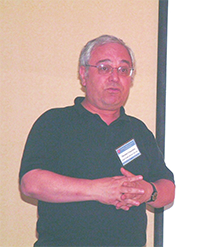| 發刊日期 |
2003年3月
|
|---|---|
| 標題 | 有朋自遠方來 — 專訪 Mariano Giaquinta教授 |
| 關鍵字 | |
| 檔案下載 | |
| 全文 |
策 畫 : 劉太平 
Mariano Giaquinta 是在義大利深厚的變分學的傳統下訓練出來的數學家, 承繼 Dini, Fubini, Tonelli, Caccioppoli 和 De Giorgi 的傳統, 在變分學的現代理論和橢圓型偏微分方程組的解的存在性及解的正則性問題上都有重要的貢獻。 他曾任教於佛羅倫斯大學、比薩大學, 目前在高等師範學校擔任教授, 並任 De Giorge 數學研究中心主任。義大利高等師範學校是由拿破崙所創立, 是義大利最重要的科學家的養成所, 著名的物理學者 Fermi 即出生於此。 劉: 今天是為了 「數學傳播」季刊的「有朋自遠方來」專欄而做這個訪問。當然義大利是夠遠的! (眾笑) 你是位著名的數學家, 可否請你先簡單地談談你的求學背景, 如果可能的話, 是什麼將你帶入數學的領域? Giaquinta: (以下簡稱 G) 這是一個好問題! (眾笑) 高中時代, 我對於數學並不感到特別地困難。 後來, 聽說在比薩 (Pisa) 可以學到好的數學, 我便到那兒讀書。 嗯...我必須說我不是一個好學生。 當時我的主要目標是盡快完成學業, 並在經濟上能夠獨立。 獲得大學學位之後, 我有一段美好的時光, 因為我被大學留下來開始在比薩做研究。 那時, 比薩真是個非常好的地方, 像 Bombieri, De Giorgi, Stampacchia, Andreotti, Campanato, Prodi 和 Vesentini* * 都是有名的數學家 全部在那兒。 劉: 那是什麼時候?
G: 我是1966到1969就讀 Pisa 大學。 緊接著得到學位之後,
我先在巴黎待了一年, 然後回到比薩直到1976年, 那年我得到 Modena 的教授職位。
而後我在 Ferrara 待了兩年, 然後到佛羅倫斯大學 (The University of Florence)。
六年前到比薩大學, 三年前我開始在高等師範學校 (Scuola Normale Superiore)
擔任教授。
劉: 你可否多說一些你在比薩的那段美好的時光? G: 那真是一段特殊的時光。 那時 De Giorgi 剛剛發展了極小曲面 (minimal surfaces) 的理論和證明了橢圓方程 (elliptic equations) 的 regularity theorem; Bombieri, De Giorgi 和 Giusti 正給出 Bernstein 問題的反例; 而同時 Stampacchia 也正發展變分不等式 (variational inequality) 的理論。 許多有意思的技巧都是在那時發展的, 像 regularity 及 partial regularity 理論中的技巧, 可說是近年來發展的所有 regularity 理論的模型。 劉: 當時, 你是如何接觸這些優秀的人呢? G: 經由上課和參加研討會; 還有跟他們交談。 我記得那時不像現在有那麼多的書籍, 但是那兒有著一種討論講述的傳統。 這種傳統是非常正面的, 因為人們能夠相當快地知道新的事情。 此外, 那時對於發表論文的壓力是比較小的。 這些是當時文化特色的一部份。 那時在比薩並沒有如此多的教師, 在數學這科或許只有10位, 但現在大約有70位。 所以要時時知道或許有什麼事情正在發生就變得極度困難。 十個人常常能相互對話, 七十個人就很難了。 還有, 如果有太多的研討會, 結果就是人們連一個也沒參加。 假設只有兩個研討會, 那麼每個人會覺得他必須去; 但如果太多的話, 你則會開始認為沒有時間去參加全部的研討會, 而決定不去任何一個。 但在另一方面這樣對學生是有好處的, 因為他們能學習許多不同的領域和觀點。 劉: 很多年前, 我讀到一篇 S. Hilderbrant 寫的文章, 描述在德國 Oberwolfach 的一些活動。 你能談談這個嗎?
G:
從70年代中期到90年代中期, 每2年我都參加在 Oberwolfach 所舉行的變分學 (Calculus
of Variations) 會議。 現在的 Oberwolfach 甚至是比從前更為活躍,
且關於變分學的會議也還持續在進行中。 在從前剛開始時, 與會者不多,
大部分是從事相同領域的研究。 早上通常有一些演講, 而下午則只是相互交談,
或是討論問題, 或是聊天, 有許多自由的時間。 那是非常地有啟發性。
劉: 是啊! 我也與你有相同的感覺。 G: 對我而言, 這些事看起來對數學而言不是正面的。 劉: 你知道台灣年輕人通常是很難和資深的長輩說話的嗎?
G:
哦, 在比薩不是那麼難的。 因為比薩是一個很小的城鎮,
大約有10萬居民且大多數不是住在市中心,
因此在市中心很多時候你會遇到的是學生和教師。 他們就在那兒。 譬如說我,
現在我住在佛羅倫斯, 每星期通車到比薩, 在那兒待三、四天。 當我在那兒時,
從早上八點到晚上十、十一點我或是在我辦公室、或和某人一起工作、或是碰見某人一起去晚餐。
大多時候, 這個人是同事或學生。
劉: 剛剛我提到年輕人與教授交談有困難, 我並不是指他們沒有機會去談。 他們有機會, 很多機會。 通常, 這種難處來自他們自己, 他們害怕去說。 G: 哦, 這在義大利也是一樣, 學生們害怕說話。 他們有機會, 但是害怕。 陳: 他們害怕說話只是在談論數學時或者是在所有的情況下都如此? G: 我想是在所有的情況下! 一個理由或許是年齡及職位的差別。 學生通常較喜好和助理而非和教授們交談, 因為他們多少年紀相仿。 我認為另一個理由是因為考試這個系統。 他們曉得他們必須通過考試, 所以不願展示自我。 他們總害怕你會由此去衡量他們, 而我認為這有時候甚至也真是如此。 陳: 每次我去見我指導老師的時候, 總希望自己準備得很好。 (眾笑!) G: 不過, 身為學生, 你是會害怕的。 我不能說我總是有準備的。 我喜歡與人合作, 不喜歡單打獨鬥, 因為那比較有趣。 不過我時常有些愚蠢的數學陳述或是些不正確的證明。 這或許從不會發生在好的數學家身上, 但卻經常發生在我身上。 陳: 你能夠提一些在變分學上未解決的問題或新的研究方向嗎? G: 嗯, 變分學可說是某些問題和方法的集合, 很難指出好的待解的 (good open) 方向。 但我想一個主要的方向是去了解牽涉到非純量函數 (non-scalar functions) 的變分問題, 好比說像調和映射 (harmonic mappings), 楊--米爾斯泛函 (Yang-Mill's functional) 及一些描述細微結構的物理模型等等的幾何變分 (geometric variational) 問題。 這些問題的共通處是會有奇異點 (singularities) 產生。 這些奇異性是重要的, 有時候奇異解 (singular solutions) 甚至比平滑解 (smooth solutions) 更為重要。 明瞭這種奇異點, 它們如何產生, 結構如何, 是非常重要的課題。 陳: 至於有些老的但仍舊重要的問題呢? G: 有很多懸而未決的老問題, 例如對極小曲面的孤立 (isolated) 奇異點做分類, 或是研究較高餘維 (co-dimensional) 的極小曲面或圖形 (graph)。 陳: 你提到了極小組態 (minimal configuration)。 為何我們總試著要找到極小組態而非定態 (stationary configuration) 呢? G: 或許是因為它比較簡單吧。 另外, 極小解 (minimizer) 有較強的性質。 例如有與物理相關的能量泛函, 其臨界點 (critical points) 在所有的地方都是奇異的, 然而極小解只在些較低維度的集合才是奇異的。 有些時候, 極小性 (minimality) 可用一些穩定性 (stability) 來取代。 陳: 或許你能夠解答我心中的一個問題, 為什麼在物理的世界中常存在變分原理 (variational principle)? 你的觀點是如何呢? G: 我想你的問題可以很多方法來回答。 我們可以像從前一樣說上帝以可能的最佳的方法去創造宇宙中的每個事物; 或者我們可以說數學就是如此地運作; 或者我們可以說當我們嘗試去解釋自然現象時, 我們尋求的是些簡單的原理, 而極小原理 (minimum principle) 是個非常簡單的原理。 陳: 這相當像許多數學或物理學家所喜愛的所謂簡約性 (simplicity)...
G:
是的! 可能是相同的法則。 假使我們以一個繁複的原理為基礎來解釋某些事情,
我們並沒有解釋得很多,
因為我們事實上或許是在用比要解釋的事情更為複雜的事物去解釋該事物。 (眾笑!)
劉: 在義大利, 是從六歲開始上小學嗎? G: 是的, 六歲。 但是有倡議改成允許五歲入小學的提案。 目前孩童六歲入學, 讀了五年小學後, 接著是三年的初中和五年的高中。 今年開始, 在大學施行新的制度: 修業三年得第一個學位, 再二年得第二個學位, 然後再經三年得到博士學位。 劉: 學生在小學時只學義大利文, 或者還學其它語文? G: 除義大利文外, 現在從三年級起, 他們開始非正式地學一種外國語文, 我想正式開始學是在初中時。 有些學校可允許學生選擇兩種外語。 課程規定在義大利的學校是非常嚴的, 中學裡學生沒有選擇科目的權利, 所有的課程都是固定的。 如果有教第二外語的話, 通常是在正規的課程外, 在下午加幾個小時的課。 過去, 學生通常是學法文, 但現在多半要求學英文。 但學校裡有些教法文但又不能夠被裁掉的老師, 所以有些學生必須學法文! (眾笑!) 但是通常學法文的學生也學英文的。 結果他們學兩種外國語文, 這是好事。 劉: 台灣學生在初中時開始學英文, 現在也試著在小學裡辦。 對於這, 你的看法如何? G: 我認為很好的。 例如說在我念書時也有外語, 但主要是學歷史和文學而且很少講。 學生被要求學習所有的規則和所有的例外等等。 但現在情況是有改變了。 我仍舊記得在法文裡頭的不同的規則和例外, 但是我學到的單字不多。 現在每當我說法語時, 我會立即覺察到我犯了許多錯誤, 而我卻很難表達自己。 雖然我從來沒學過英語, 甚至會犯比講法語更多的錯誤, 但對英文我覺得有更多的信心。 (眾笑!) 劉: 這話真有意思。 G: 我必須說就語言而言美國人是非常會包容的, 而法國人就不是那麼包容的。 劉: 時間不多了, 我想問最後一個問題。 什麼是你對準備學數學的年輕學子的建言呢? 陳: 或許請給一些忠告, 有關年輕人應該盡可能多學不同的方向以增廣視野或者該盡早專攻一門學問。 G: 給建言總是很難的。 如果你專研一門學問, 好處是能夠做得愈來愈深入, 但這也許是非常危險的事。 另一方面, 年輕時一個人可以學會很多事, 年紀愈大就愈來愈難去學新的事物, 雖然經驗會有些幫助。 現在由於競爭激烈, 人們為了很快地發表論文, 必須很早就做專業的研究, 而學習難免佔去一些做論文的時間。 我認為年輕的學子應該學著兩者兼顧。 當然有人能夠學很快, 也有能夠學得又多又快非常優秀的學生, 不過也有像我這樣需要時間去學習的學生。 陳: 所以, 根據經驗, 每個人能夠決定自己最好的學習方式。 但是, 這很費時間。 G: 是啊, 很不幸地。 沒有規則是你可以照著去做而能得到肯定的結果的, 一切都歸結於個人在生命中擁有的經驗。 劉: 或許我們必須在此打住。 非常謝謝你, 這真是一次非常有趣的訪談。 ---本文訪談者劉豐哲為中央研究院數學所研究員, 陳怡全為博士後研究--- |
2003年3月 27卷1期
有朋自遠方來 — 專訪 Mariano Giaquinta教授

